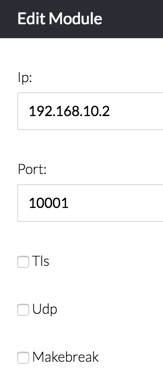Device Drivers
Device drivers implement a protocol on a raw transport stream, TCP or UDP. For examples see our open repository of device modules.
Backoffice can be used to define settings.

Use Transport Layer Security (TLS) for encrypted communications
UDP for stateless communication (UDP connections are always considered connected)
Multicast IP’s are automatically detected and subscribed to the multicast group
Use Make Break if you want the module to disconnect when there is nothing to communicate
Some devices require you work this way, this helps automate the process
Typical Layout
Transmitting a Request
Requests are added the transmit queue by calling send(raw_cmd, options_hash).
The raw_cmd can be in a number of formats:
String => will be transmitted as is
Array of bytes => will be automatically converted to a string for sending
Hex String => will be converted to a binary string if requested
send('0xbeef', hex_string: true)
The options are as follows:
Option
Default Value
Description
wait
true
do we want to wait for a response before we continue processing
delay
0
minimum delay time between sends (milliseconds)
delay_on_receive
0
time to delay the next transmit after receiving data (milliseconds)
max_waits
3
number of times we’ll accept an ignore response before retrying the request
retries
2
number of times we’ll retry a command if it has failed
timeout
5000
amount of time we’ll wait for a response to a command before retrying (milliseconds)
priority
50
so we can perform commands in preference to others (see section on priorities)
force_disconnect
false
causes the transport to disconnect once a response has been received
clear_queue
nil/false
removes any other queued commands once it starts transmitting
name
nil
command type (e.g. :power). Queued commands of the same time will be overridden.
emit
nil
callback to occur when that request completes. Will not be called if another request with the same name overrides this request.
on_receive
nil
alternative receive function or block. Called in stead of received function
Processing a Response
It’s expected that the received function or on_receive callback return a result for the current command. When data is received, this function is called to see if
The command was a success
This data has nothing to do with the command in question
Some devices push data
Some kind of failure
The expected values that should be returned by this function:
Value
Description
true, :success (or result if not on of the values below)
We’ve finished processing this command, move on to the next
false, :retry, :failed, :fail
The command didn’t have the desired result, maybe the device was busy. Please send this command again
nil, :ignore
This data was not in response to our action. Continue waiting.
:abort
The command failed and it should not be retried. Abort differs from success as it is logged.
:async
Waits for the command to resolved by the deferrable passed to the received function
Priorities
Priorities ensure requests are processed in a sane order. For example if you are polling a projector for status and it only accepts one command every 300 milliseconds you don’t want to wait for the polling, which might be 4 or 5 requests, to complete before executing a more important request like selecting a new input.
Sometimes a query might be made for control flow purposes so it is often useful to differentiate between user initiated requests and polling.
Priorities are also increased on a contextual basis. This is how retries, for instance, make their way back to the front of the queue - which is what you would expect. There is a configuration option called priority_bonus which increases the priority of a command in the following circumstances:
Any request made when processing a response to a request
If you request volume status whilst processing the switching of an input, the query will receive a bonus and jump towards the front of the queue
When a command fails and is retried, it also receives a bonus.
NOTE:: given default values, if you send commands in the received function and then return failed so the command is retried, the commands sent will be executed before the retry. You can counter this effect by providing lower priorities in this context.
Helper functions
Helper functions interact with the local state of a driver. Defining a setting, for instance, will not overwrite any shared system state.
Name
Description
disconnect
disconnects the current connection. It does not wait to send any buffered data
remote_address
returns the IP address or hostname defined in the database
remote_port
returns the port number defined in the database
defaults (options hash)
allows you to set custom default options for commands
config (options hash)
allows you to set custom processing configurations
set_connected_state (true or false)
overrides the default connection indicator (useful for UDP devices)
define_setting (:key, value)
persists a setting value in the database that impacts the current driver instance
For the various defaults and configuration options see the command processor.
When you include ::Orchestrator::Constants some common configuration and default options are exposed in a more declarative manner.
Last updated